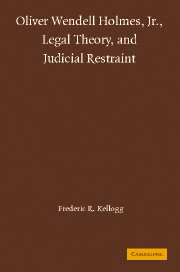Book contents
- Frontmatter
- Contents
- Preface
- 1 A Time for Law
- 2 Playing King: Connections and Misconceptions
- 3 Holmes's Conception of Law
- 4 Common Law Theory Revisited
- 5 Holmes and Legal Classification
- 6 The General Theory of Liability
- 7 Morals and Skepticism in Law
- 8 Judges, Principles, and Policy
- 9 Common Law Constitutionalism
- 10 Holmes's Theory in Retrospect
- 11 Conclusion
- Appendix
- Bibliography
- Index
5 - Holmes and Legal Classification
Published online by Cambridge University Press: 24 July 2009
- Frontmatter
- Contents
- Preface
- 1 A Time for Law
- 2 Playing King: Connections and Misconceptions
- 3 Holmes's Conception of Law
- 4 Common Law Theory Revisited
- 5 Holmes and Legal Classification
- 6 The General Theory of Liability
- 7 Morals and Skepticism in Law
- 8 Judges, Principles, and Policy
- 9 Common Law Constitutionalism
- 10 Holmes's Theory in Retrospect
- 11 Conclusion
- Appendix
- Bibliography
- Index
Summary
[E]very positive law, or every law strictly so called, is a direct or circuitous command of a monarch or sovereign number to a person or persons in a state of subjection to its author. And being a command (and therefore flowing from a determinate source), every positive law is a law proper, or a law properly so called.
Besides the human laws which I style positive law, there are human laws which I style positive morality, rules of positive morality, or positive moral rules. (134)
In consequence of the frequent coincidence of positive law and morality, and of positive law and the law of God, the true nature and fountain of positive law is often absurdly mistaken by writers upon jurisprudence. (162)
John Austin, The Province of Jurisprudence Determined (1832)The decade of the 1870s, the first part of which Holmes took up the subject of legal classification, demonstrated a seriousness of purpose that seems incongruent with the blithe spirit who half a century later would write to his friend Frederick Pollock:
[Justice] Brandeis the other day drove a harpoon into my midriff with reference to my summer occupations. He said you talk about improving your mind, you only exercise it on the subjects with which you are familiar. Why don't you try something new, study some domain of fact? Take up the textile industries in Massachusetts and after reading the reports sufficiently you can go to Lawrence [Mass.] and get a human notion of how it really is. I hate facts. […]
- Type
- Chapter
- Information
- Publisher: Cambridge University PressPrint publication year: 2006



